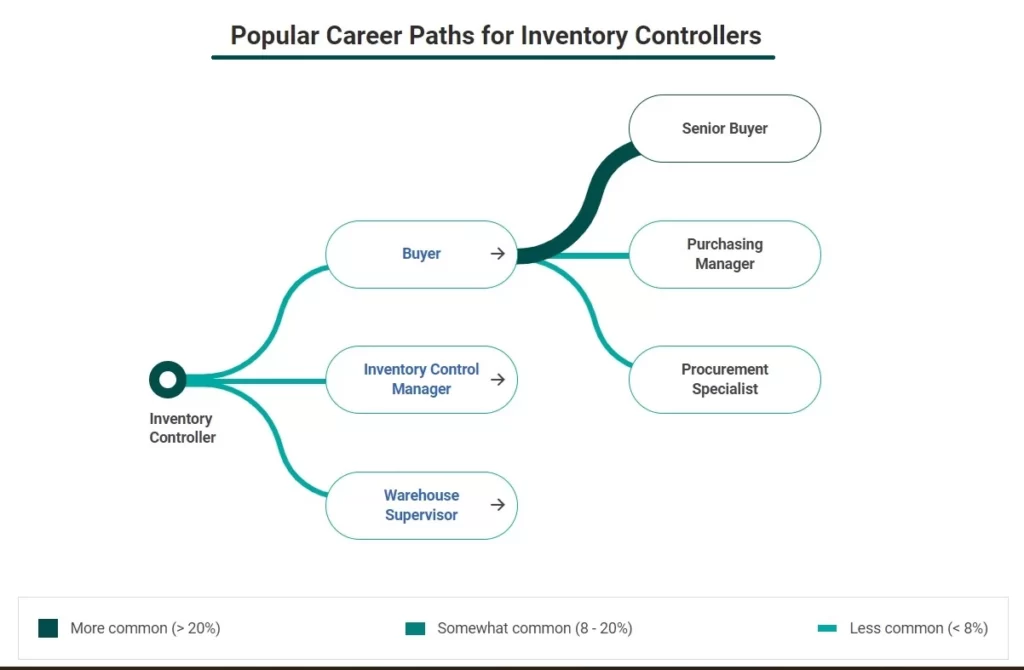Inventory controllers are essential personnel in the supply chain management process of an organization. They are responsible for managing inventory levels, ensuring that the right products are available at the right time and place.
The career path of an inventory controller offers many opportunities for growth and advancement, making it an attractive career choice for those interested in supply chain management.
What positions fall in the career path of inventory controller?
An inventory controller career path typically includes entry-level roles such as inventory clerk or coordinator, progressing to positions such as inventory analyst or specialist, and eventually to the role of an inventory manager or controller. The positions involve tasks such as counting and organizing inventory, managing inventory systems, analyzing data, and collaborating with other departments to ensure accurate inventory levels.

Career Path Of Inventory Controller
Table of Information:
| Career Stage | Key Responsibilities |
|---|---|
| Entry-Level | Receiving and counting inventory, performing inventory checks, maintaining inventory records |
| Specialized Training and Certification | Obtaining certification, enhancing skills and knowledge in inventory management |
| Inventory Coordinator | Overseeing inventory management process, inventory planning, forecasting, and ordering |
| Inventory Manager | Managing team of inventory coordinators, developing and implementing inventory policies and procedures, analyzing inventory data |
| Supply Chain Manager | Overseeing entire supply chain process, procurement, production, logistics, working with other departments to meet strategic goals and objectives |
Now, here is detailed description of each positions,
Entry-Level Positions
To begin a career as an inventory controller, most individuals start in an entry-level position such as a stock clerk or warehouse associate. These positions require a high school diploma or equivalent and provide an opportunity to learn the basics of inventory management. Some of the key responsibilities in these positions include receiving and counting inventory, performing inventory checks, and maintaining inventory records.
Specialized Training and Certification
After gaining experience in entry-level positions, individuals may choose to pursue specialized training and certification to enhance their skills and knowledge in inventory management. Obtaining certification can demonstrate expertise and provide a competitive edge in the job market. One widely recognized certification is the Certified in Production and Inventory Management (CPIM), offered by the Association for Supply Chain Management (ASCM). This certification covers topics such as demand management, material requirements planning, and inventory control.
Inventory Coordinator
After obtaining specialized training and certification, an individual can move up to an inventory coordinator position. In this role, they are responsible for overseeing the inventory management process, including inventory planning, forecasting, and ordering. They work closely with other departments, such as purchasing, sales, and logistics, to ensure that inventory levels are optimal and that the company is meeting its production and sales goals.
Inventory Manager
The next step in the career path of an inventory controller is becoming an inventory manager. In this role, they are responsible for managing a team of inventory coordinators and ensuring that the inventory management process is running smoothly. They also develop and implement inventory policies and procedures and analyze inventory data to identify trends and opportunities for improvement.
Supply Chain Manager
Another potential career path for inventory controllers is becoming a supply chain manager. In this role, they are responsible for overseeing the entire supply chain process, including procurement, production, and logistics. They work closely with other departments, such as finance and marketing, to ensure that the company is meeting its strategic goals and objectives.
The career path of an inventory controller provides many opportunities for growth and advancement, from entry-level positions to becoming a supply chain manager. Specialized training and certification can help individuals stand out in the job market, and experience in each role provides skills and knowledge necessary to advance to the next level. With the right skills and experience, an inventory controller can build a successful and rewarding career in supply chain management.